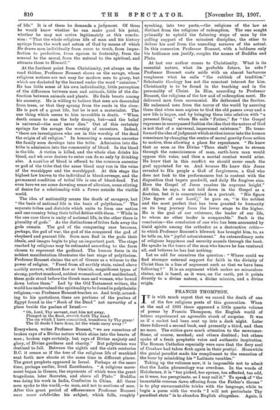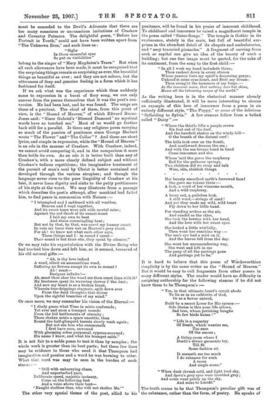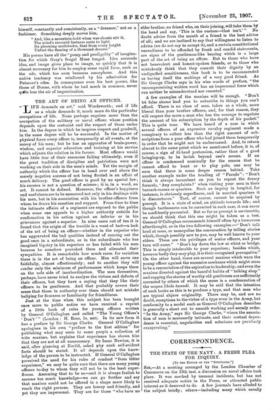FRANCIS THOMPSON.
IT is with much regret that we record the death of one of the few religious poets of this generation. When at the end of 1893 there appeared a little quarto volume of poems by Francis Thompson, the English world of letters experienced an agreeable shock of surprise. It was as if a rocket had been sent up into a dark night. Later there followed a second book, and presently a third, and then no more. The critics gave much attention to the newcomer. Some, of course, mocked; and others doubted ; but others spoke of a fresh prophetic voice and authentic inspiration. The Roman Catholics especially were sure that the fiery soul of Crashaw had taken flesh again in their protégé. Meanwhile the genial parodist made his compliment to the sensation of the hour by mimicking his " Latinate vocables."
Taking up the volumes now, it is impossible not to admit that the Latin phraseology was overdone. In the words of Holofernes, it is "too picked, too spruce, too affected, too odd, as it were, too peregrinate, as I may call it." To speak of " the immutable crocean dawn effusing from the Father's throne" is to play unwarrantable tricks with the language, while to begin a poem with the words "I will not perturbate Thy paradisal state " is to abandon English altogether. Again, it must be conceded to the Devil's Advocate that there are too many conscious or unconscious imitations of Crashaw and Coventry Patmore. The delightful poem, " Before her Portrait in Youth," could not have been written apart from "The Unknown Eros," and such lines as : "Sighs In those mournful eyes So put on visibilities" belong to the singer of "Mary Magdalen's Tears." But when all such allowances have been made, it must be recognised that the surprising things remain as surprising as ever, the beautiful things as beautiful as ever ; and they are not echoes, but the utterances of deep and genuine feeling in a form which it has fashioned for itself.
If we ask what was the experience which thus suddenly came to expression in a burst of fiery song, we can only answer from the poems themselves that it was the poet's con- version. He had been lost, and he was found. The songs are those of a penitent. The chief of them, from this point of view, is the " Hound of Heaven," of which Edward Burne- Jones said: "Since Gabriel's 'Blessed Damozel ' no mystical words have so touched me." Most of us would go further back still for a parallel. Is there any religious poem carrying so much of the passion of penitence since George Herbert wrote " The Flower" and " The Collar" ? And these are short lyrics, and simple in expression, while the "Hound of Heaven" is an ode in the manner of Crasbaw. With Crasbaw, indeed, we cannot avoid comparing it, and in the comparison it more than holds its own. As an ode it is better built than any of Crashaw's, with a more clearly defined subject and without Crashaw's tedious repetitions; the imaginative treatment of the pursuit of man's soul by Christ is better sustained and developed through the various strophes ; and though the language never rises to the pure limpidity of Crashaw at his best, it never loses dignity and sinks to the petty prettinesses of his style at the worst. We may illustrate from a passage which describes the poet's attempt, after mankind had failed him, to find peace in communion with Nature :—
" I triumphed and I saddened with all weather,
Heaven and I wept together, And its sweet tears were salt with mortal mine ; Against the red throb of its sunset-heart I laid my own to beat And share commingling heat; But not by that, by that, was eased my human smart.
In vain my tears were wet on Heaven's grey cheek.
For ah ! we know not what each other says,
These things and I : in sound I speak—
Their sound is but their stir, they speak by silences."
Or we may take his expostulation with the Divine Being who
bad tracked him down and left him, as it seemed, bereaved of his old natural gifts :—
" Ab, is thy love indeed
A weed, albeit an amaranthine weed,
Suffering, no flowers except its own to mount ? 'Ah ! must—
Designer infinite !— Ali, must thou char the wood are thou canst limn with it?
My freshness spent its wavering shower i' the dust; And now my heart is as a broken fount, Wherein tear-drippings stagnate, spilt down ever From the dank thoughts that shiver Upon the sighful branches of my mind."
Or once more, we may remember his vision of the Eternal:- " I dimly guess what Time in mists confounds;
Yet ever and anon a trumpet sounds From the hid battlements of eternity ;
Those shaken mists a space unsettle, then
Round the half-glimpsed turrets slowly wash again; But not are him who summoneth I first have seen, enwound With glooming robes purpureal, cypress-crowned; His name I know, and what his trumpet saith."
It is not fair to a noble poem to test it thus by samples ; the whole work is greater than its best parts ; but these few lines
may be evidence to those who need it that Thompson had imagination and passion and a word he was burning to utter.
What that word was may be seen in the burden of each stanza " Still with unhurrying chase, And unperturbed pace, Deliberate speed, majestic instancy, Come on the following feet And a voice above their beat-
' Naught shelters thee, who wilt not shelter Me.'"
The other very special theme of the poet, allied to his penitence, will be found in his praise of innocent childhood. To childhood and innocence he raised a magnificent temple in the poem called "Sister-Songs." The temple is Gothic in its exuberance, stately in the main, but full of beautiful sur- prises in the abundant detail of its chapels and ambulatories, and " aery traceried pinnacles." A fragment of carving from arch or capital can give no idea of the beauty of such a building; but one fine image must be quoted, for the sake of its sentiment, from the song to the first child :— " In all I work my hand includeth thine; Thou rashest down in every stream Whose passion frets my spirit's deepening gorge ; Unhood'st mine eyas-heart, and fliest my dream :
Thou swing'st the hammers of my forge :— As the innocent moon, that nothing does but shine, Moves all the labouring surges of the world."
As the writing here is in the rhetorical manner already sufficiently illustrated, it will be more interesting to choose an example of this love of innocence from a poem in an entirely different style, "The Poppy," or some of the delicious " Syllabling to Sylvia." A few stanzas follow from a ballad called "Daisy" :— " Where the thistle lifts a purple crown Six foot out of tho turf, And the harebell shakes on the windy-hill- 0 the breath of the distant surf !
The hills look over on the South, And southward dreams the sea ; And with the sea-breeze hand in hand Came innocence and she.
Where 'mid the gorse the raspberry Red for the gatherer springs, Two children did we stray and talk Wise, idle, childish things.
Her beauty smoothed earth's furrowed face! She gave me tokens three :- A look, a word of her winsome mouth, And a wild raspberry.
A berry red, a guileless look, A still word,—strings of sand !
And yet they made my wild, wild heart
Fly down to her little hand.
For standing artless as the air, And candid as the skies, She took the berries with her band, And the love with her sweet eyes.
She looked a little wistfully, Then went her sunshine way :- The sea's eye had a mist on it, And the leaves fell from the day.
She went her unremembering way, She went and left in me The pang of all the partings gone And partings yet to be."
It is hard to believe that this poem of WOrdsworthian simplicity is by the same writer as the " Hound of Heaven." But it would be easy to cull fragments from other poems in many different styles. The reader would have no difficulty in assigning authorship for the following stanzas if he did not know them to be Thompson's :-
"Yea, in that ultimate heart's occult abode To lie as in an oubliette of God, Or as a bower untrod, Built by a secret Lover for His sponse :— Sole choice is this your life allows, Sad tree, whose perishing boughs So few birds house !"
" Life is a coquetry Of Death, which wearies me, Too sure Of the amour ; A tiring-room where I Death's divers garments try, Till fit Some fashion sit.
It seemeth me too much I do rehearse for such
A. mean And single scene."
" When dusk shrunk cold, and light trod shy, And dawn's grey eyes were troubled grey; And souls went palely up the sky, And mine to Lucia"
The truth seems to be that Thompson's peculiar gift was of the substance, rather than the form, of poetry. He speaks of
himself, constantly and consistently, as a " dreamer," not as a fashioner. Something deeply moves him,
"And, like a mountain-hold when war-shouts stir it, The mind's recessed fastness casts to light Its gleaming multitudes, that from every height Unfurl the flaming of a thousand dreams."
His poems have all the "pomp and prodigality" of imagina- tion for which Gray's frugal Muse longed. Idea succeeds idea, and image gives place to image, so quickly that it is almost necessary for him to employ some rapid form, such as the ode, which too soon becomes amorphous. And this native tendency was reinforced by his admiration for Patmore's odes. In consequence even his best poems, like those of Donne, with whom he had much in common, never quite lose the air of improvisation.




















































 Previous page
Previous page